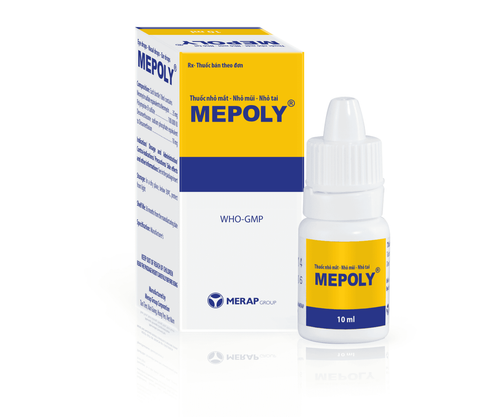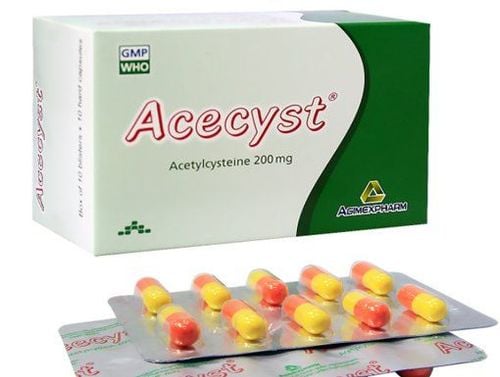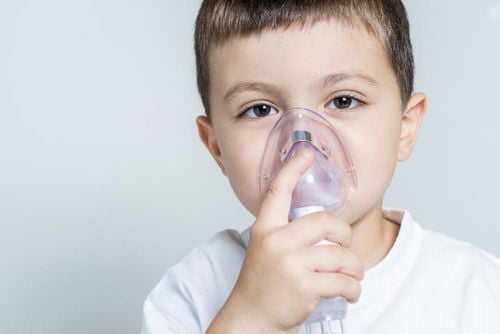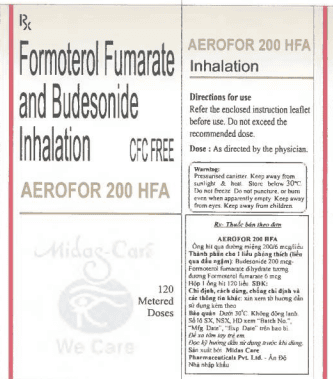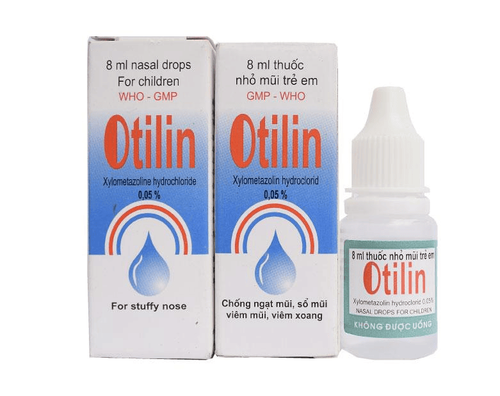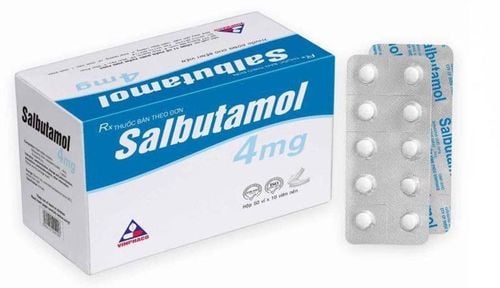This is an automatically translated article.
Posted by Doctor Tran Thi Diem Trang - Respiratory Internal Medicine Doctor - Department of Examination & Internal Medicine - Vinmec Central Park International General Hospital
Asthma is a fairly common disease in many different ages, although it is difficult to completely cure it, the patient can control the disease well and live, work, study normally. However, it is necessary to pay attention and avoid some problems so that the disease does not get worse.
1.The medicines that asthmatics should not take
It should be noted that patients should avoid using drugs that aggravate asthma, including: beta-blockers (propranolol, metoprolol, atenolol, bisoprolol, carvedilol...), often used in the treatment of hypertension, tachycardia, hyperthyroidism. Asirine, non-steroidal anti-inflammatory drugs (piroxicam, meloxicam, ibuprofen, diclofenac...), often used in pain relief, anti-inflammatory, antipyretic. Group of expectorants (bisolvon, N-acetyl cysteine, ambroxol, aprazinon...), often used when coughing, wheezing. Group of drugs to reduce cough, sedative, induce sleep...
Non-inhaled asthma medications: Triamcinolone intramuscularly (K-cort, kenacort...) is injected once every 2-3 months, causing many effects. Severe side effects, no longer used since 1988, currently only inhaled corticosteroids are most effective.
2. Incorrect operation when using inhaler
Inhaling or spraying medicine into the mouth is considered simple by many patients. In fact, there are many mistakes in this operation because pharmacists often only give very vague instructions on how to use it, not to mention that the patient is also guided by many other people (untrained). Although the inhalers come with the manufacturer's instruction sheet, but due to subjectivity, few patients read and do it carefully, sometimes even read it but do not fully understand it, resulting in incorrect manipulation, not shaking the medicine first. not fully exhaling, not synchronizing the inhaler's hand with the inhaler's mouth, not taking a deep enough breath deep into the small bronchi. The patient can only achieve this on condition that they must try to inhale deeply and then hold their breath for another 10 seconds. If you inhale and detect smoke coming out of your mouth and nose, it is clear that the patient is not breathing effectively.
3. Glucocorticoid drugs should not be abused in the treatment of asthma
The introduction of corticosteroids has made a positive contribution to the treatment of asthma and other allergic and autoimmune diseases... When asthmatics are treated with corticosteroids they feel like taking a miracle drug, their symptoms are relieved. very fast. However, corticosteroids are one of a group of drugs that cause many side effects such as metabolic disorders, Cushing's syndrome, hirsutism, menstrual disorders, growth retardation, muscle atrophy, erythema, hemorrhage, acne, Oral thrush, peptic ulcer, mental disorders, osteoporosis, cataracts, hypertension...
Admittedly, corticosteroids have brought about quite a positive treatment result for patients with autoimmune diseases. immunity, allergies and especially asthma. However, long-term abuse of this group of drugs can easily cause bad consequences. Therefore, the best way to prevent the bad consequences of corticosteroids is that the patient must be examined and treated by specialized doctors at trusted medical facilities.
To control current asthma, it is necessary to use inhaled corticosteroids alone such as becotide, budesonide, fluticasone or in combination with long-acting bronchodilators such as seretide, symbicort for very good results. Oral forms such as prednisone, prednisolone... or intravenous injection such as solumedrol, hydrocortisone... are only used when prescribed by a specialist doctor when asthma is severe or difficult to control and only used for a short period of 10 years. -14 days in hospital. Patients must not arbitrarily use and abuse other corticosteroid preparations.

4. Do not assume that asthma that does not require treatment can go away on its own
Because the cause of asthma is very complicated, the mechanism of causing the disease is not clear, so there is currently no cure for the root cause. The goals of treatment are to control the disease, reduce the number of asthma attacks, and help improve quality of life. There are two misconceptions that say that asthma can be cured without treatment and need to be clarified.
That is, many people in the patient's family observe that children with asthma will go through puberty spontaneously, cured or not, it doesn't matter. This misconception causes many asthmatics to lose beneficial opportunities for treatment. In fact, the percentage of children with asthma developing into adolescence is still high (between 5-10% and 60-70%). In the early stages of asthma in children, parents should follow the instructions of the doctor to be able to control the development of asthma. Doing so will help children cope with the pain of the illness and can affect the disease in adolescence when asthma will go away on its own.
Second, because asthma cannot be cured completely, the treatment or not is the same. Actually having treatment or not are two completely different things, with asthmatic patients with proper treatment, they can live, work, teach, produce, go to school... like healthy people. normal strength. As for patients who do not adhere to treatment and have repeated asthma attacks, it will seriously affect their quality of life, gradually they will become depressed, suffer from complications of severe, chronic asthma and respiratory failure, cor pulmonale, and sometimes death due to severe acute asthma attacks.
5. Foods that asthmatics should not use
There are many questions surrounding the issue, what should people with asthma avoid? Foods to be careful about are thought to be asthma triggers including cow's milk, egg yolks, goat meat, greasy, rooster, duck meat, goose meat, cat meat, dog meat, snake meat, snails, crabs, shrimps, oysters, clams, seaweed, dried bamboo shoots, dried lychees, longan, coconut, sweet potato, pumpkin, potato, garlic, pepper, chili, cauliflower, chives, banana oil, chocolate, food color, coffee, ice cream, coca, cake, cold drinks, tobacco, alcohol, strong tea... However, these foods depend on and vary greatly from one patient to another.
6. Asthmatics are not allowed to play sports
Actually, exercise is always beneficial for health, even for asthmatics. Asthma patients can practice gentle sports such as walking, cycling, qigong, aerobics, swimming... However, before that, it is necessary to pay attention to warm up, warm up and drink enough water. Avoid sports that require a lot of effort and practice in the cold season, with a lot of mold and pollen. Asthma patients should consult a doctor to choose a subject and determine the appropriate exercise intensity for their health status. During the game, you must also adhere to the treatment regimen as directed. When necessary, inhale 2-4 puffs of reliever medication 30 minutes before exercise. During exercise, if asthma symptoms appear, you should stop immediately, use reliever medication. seizures and see a doctor.

7. Failure to receive treatment as planned
Due to the chronic nature of asthma, many patients are unable to maintain their treatment as planned. This has a great influence on the effectiveness of asthma treatment. The reasons why the patient cannot adhere to the treatment plan are:
Due to repeated asthma attacks, the patient is tired. They hope to use a certain drug or treatment method that can cure asthma at the root of the disease. Therefore, patients often go everywhere to find an effective remedy, visit many doctors, go to many clinics and hospitals, use many types of medicine including traditional medicines, acupuncture, inhaling leaves. poisons, eating many asthmatic animals, mangrove claws, crabs, termites, lizards... They try many methods, regardless of whether the method is accurate, recognized as effective or not, even endanger yourself. Usually a drug is used by the patient only a few times, for a few days, then if it is not effective, then switch to another type, so the treatment process is interrupted and not continuous. In fact, if the patient is carefully educated and explained in detail, the patient only needs to follow the instructions and persist in the treatment plan for a long time, although it cannot cure the root cause of the disease. multifactorial nature of the disease, but it is completely possible to control asthma well.
Only focus on curing asthma without thinking about long-term effects. When the asthma is under control, do not think that you need to continue treatment to prevent the asthma attack from coming back and maintain a stable condition. Even when the body is “seemingly normal” and during recovery, inflammation of the airways persists, and when a person is exposed to triggers and allergens, an acute attack can return. At any time. In fact, the treatment of asthma is prevention-based. If done well, prevention will limit the recurrence of acute asthma attacks.
8. Assume that regular drug use causes drug resistance
There are many patients who believe that using asthma medication regularly will make them resistant, so no matter how their symptoms are, they "prefer the medicine and save it", don't dare to use it much. Among asthma medications, only rapidly effective beta-2-receptor agonists cause desensitization (but not resistance) during use, even for a short, effective period. The result will then decrease. As long as the patient stops taking the drug for a short time or uses it in combination with corticosteroids, the patient's sensitivity to beta-2 receptor agonists will be restored. Corticosteroids, especially inhaled corticosteroids, do not cause desensitization, nor are they less effective.9. Consider inhaled corticosteroids ineffective and harmful
Most people with asthma are worried and afraid of using hormone or endocrine drugs such as corticosteroids. Many patients are still worried, even though their asthma is very severe, they still abstain from using corticosteroids for fear of side effects.
There are two points to note as follows: currently, corticosteroids are the most powerful anti-inflammatory drugs. Except for asthma exacerbations (stage 1), other asthmatics are indicated to use inhaled corticosteroids according to instructions, in cases of severe asthma, a short course or intravenous injection is also required. corticosteroids. If you don't use corticosteroids, only inhale beta-2 receptor agonists to relieve symptoms, the inflammation will persist, asthma will continue to develop and increase, causing damage both physically and mentally. patient. These harms far outweigh the side effects of the corticosteroids themselves.
Currently on the market there are two-in-one inhalers (with both anti-inflammatory and long-acting bronchodilators). This type has good effect, helping patients to take both necessary preventive drugs regularly.
10. Treatment with arbitrary beta 2 receptor stimulators
During the use of drugs that stimulate beta 2 receptors, there are some patients who find the drug particularly useful and a "panacea" for them. For each acute asthma attack, only 2-4 inhalations can be used to relieve the attack immediately. Therefore, patients have great confidence in this beta-2 receptor agonist, and rarely use other drugs, especially inhaled corticosteroids.
Actually, this way of thinking is very dangerous, the beta-2 receptor agonist reliever is effective quickly, works very well in emergency cases. However, this drug does not work to suppress inflammation of the airways, the underlying cause of asthma. If only one reliever medicine is used, although it is possible to reverse the symptoms of asthma, but the asthma attack can still come back later, the number of attacks will be more and more, the amount of medicine used The disease also increases, the disease becomes more severe, and can eventually cause death due to uncontrolled airway obstruction and lack of oxygen. Therefore, when using drugs that stimulate beta 2 receptors, especially quick-acting relievers, it is necessary to combine the use of anti-inflammatory drugs according to the rules, especially inhaled corticosteroids to control asthma. thoroughly.

11. Every time you have an asthma attack, you have to take antibiotics
Asthma is a chronic inflammatory disease of the respiratory tract. The main cause of asthma is inhalation of allergens such as house mites, pollen, fur... There are a small number of patients, especially asthmatics due to intrinsic causes, before ascending to the top. asthma, symptoms of upper respiratory tract infection, fever, cough with pus, white blood cells increased, then shortness of breath, rapid breathing. Because an asthma attack is caused by an infection, it is necessary to actively treat the infection in order for the disease to improve. But there are some patients, even doctors, who don't learn carefully, taking antibiotics every time they have an asthma attack. This not only wastes medicine, but also causes drug-resistant bacteria, which is not beneficial to the patient.
Another problem to pay attention to is, there are many patients who have regular blood tests, often seeing an elevated white blood cell count. At this time, the patient should be carefully checked to see if the patient has an infection such as high fever, purulent cough, abnormal crackles in the lungs, otolaryngology, X-ray, sinusitis, pneumonia or not. Even with corticosteroids, white blood cell counts are elevated, and if there is no evidence of infection, antibiotics are not needed.
Above is the important information you need to know about bronchial asthma, if you follow it correctly in terms of prevention and treatment, your condition will be significantly improved.
If you need more specific advice in the treatment of asthma, you can contact Vinmec International General Hospital to be examined by a team of doctors with many years of experience in the profession.
Please dial HOTLINE for more information or register for an appointment HERE. Download MyVinmec app to make appointments faster and to manage your bookings easily.





